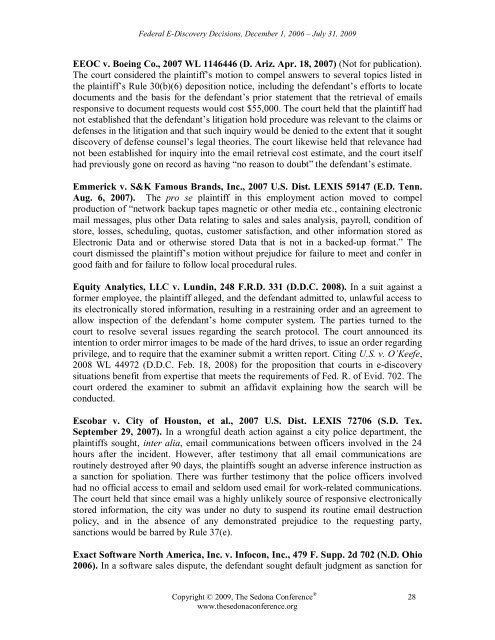Federal Court Decisions Involving Electronic Discovery, December 1 ...
Federal Court Decisions Involving Electronic Discovery, December 1 ...
Federal Court Decisions Involving Electronic Discovery, December 1 ...
You also want an ePaper? Increase the reach of your titles
YUMPU automatically turns print PDFs into web optimized ePapers that Google loves.
<strong>Federal</strong> E-<strong>Discovery</strong> <strong>Decisions</strong>, <strong>December</strong> 1, 2006 – July 31, 2009<br />
EEOC v. Boeing Co., 2007 WL 1146446 (D. Ariz. Apr. 18, 2007) (Not for publication).<br />
The court considered the plaintiff’s motion to compel answers to several topics listed in<br />
the plaintiff’s Rule 30(b)(6) deposition notice, including the defendant’s efforts to locate<br />
documents and the basis for the defendant’s prior statement that the retrieval of emails<br />
responsive to document requests would cost $55,000. The court held that the plaintiff had<br />
not established that the defendant’s litigation hold procedure was relevant to the claims or<br />
defenses in the litigation and that such inquiry would be denied to the extent that it sought<br />
discovery of defense counsel’s legal theories. The court likewise held that relevance had<br />
not been established for inquiry into the email retrieval cost estimate, and the court itself<br />
had previously gone on record as having “no reason to doubt” the defendant’s estimate.<br />
Emmerick v. S&K Famous Brands, Inc., 2007 U.S. Dist. LEXIS 59147 (E.D. Tenn.<br />
Aug. 6, 2007). The pro se plaintiff in this employment action moved to compel<br />
production of “network backup tapes magnetic or other media etc., containing electronic<br />
mail messages, plus other Data relating to sales and sales analysis, payroll, condition of<br />
store, losses, scheduling, quotas, customer satisfaction, and other information stored as<br />
<strong>Electronic</strong> Data and or otherwise stored Data that is not in a backed-up format.” The<br />
court dismissed the plaintiff’s motion without prejudice for failure to meet and confer in<br />
good faith and for failure to follow local procedural rules.<br />
Equity Analytics, LLC v. Lundin, 248 F.R.D. 331 (D.D.C. 2008). In a suit against a<br />
former employee, the plaintiff alleged, and the defendant admitted to, unlawful access to<br />
its electronically stored information, resulting in a restraining order and an agreement to<br />
allow inspection of the defendant’s home computer system. The parties turned to the<br />
court to resolve several issues regarding the search protocol. The court announced its<br />
intention to order mirror images to be made of the hard drives, to issue an order regarding<br />
privilege, and to require that the examiner submit a written report. Citing U.S. v. O’Keefe,<br />
2008 WL 44972 (D.D.C. Feb. 18, 2008) for the proposition that courts in e-discovery<br />
situations benefit from expertise that meets the requirements of Fed. R. of Evid. 702. The<br />
court ordered the examiner to submit an affidavit explaining how the search will be<br />
conducted.<br />
Escobar v. City of Houston, et al., 2007 U.S. Dist. LEXIS 72706 (S.D. Tex.<br />
September 29, 2007). In a wrongful death action against a city police department, the<br />
plaintiffs sought, inter alia, email communications between officers involved in the 24<br />
hours after the incident. However, after testimony that all email communications are<br />
routinely destroyed after 90 days, the plaintiffs sought an adverse inference instruction as<br />
a sanction for spoliation. There was further testimony that the police officers involved<br />
had no official access to email and seldom used email for work-related communications.<br />
The court held that since email was a highly unlikely source of responsive electronically<br />
stored information, the city was under no duty to suspend its routine email destruction<br />
policy, and in the absence of any demonstrated prejudice to the requesting party,<br />
sanctions would be barred by Rule 37(e).<br />
Exact Software North America, Inc. v. Infocon, Inc., 479 F. Supp. 2d 702 (N.D. Ohio<br />
2006). In a software sales dispute, the defendant sought default judgment as sanction for<br />
Copyright © 2009, The Sedona Conference ® 28<br />
www.thesedonaconference.org
















